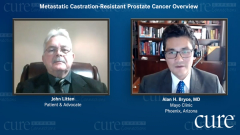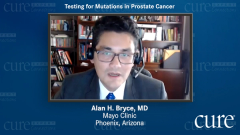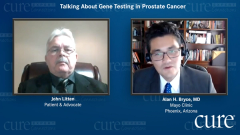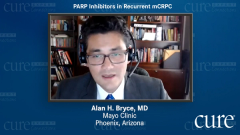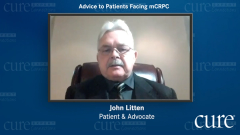
Impact of BRCA Mutations in Prostate Cancer
Episodes in this series

Transcript:
Nicholas J. Vogelzang, M.D., FASCO, FACP: What impact would a mutation have on a patient? If you find out that they have a germline [mutation], that means that they inherited it from somebody. And that they could potentially give it to their children, and that their brothers or sisters, uncles and aunts may also have that mutation. Therefore, they need to inform their family that that gene exists in the family. I remember one of my patients had a FANC gene, and he had given me an unusual history of a cousin who had leukemia and an aunt who had a brain tumor.
And then I discovered that he had the Fanconi anemia gene, FANCC. Then all of a sudden the world opened up, and his cousin with leukemia discovered that she had the gene and it’s an autosomal dominant, and then all of a sudden his kids had to know. It became important for his family to know about that gene. Some people can’t find their family. I had one guy with three daughters. He had a BRCA1, and he doesn’t know where his one daughter is. They got estranged during a divorce, and he’s tried to get a hold of her and can’t. This is the social side of this testing. On the other hand, if the patient has only a somatic [mutation], that means they cannot transmit it to their children and it was not inherited.
Because the Food and Drug Administration has approved two drugs for these genes, rucaparib and olaparib. Both called PARP [poly ADP ribose polymerase] inhibitors. There are other genes now that we need to know about, because those include Lynch syndrome, which can occur in prostate cancer. That’s what we call MMR gene mutations. We never do just one gene, we always do a whole panel of genes. But if the patient is found to have a BRCA gene and they have advanced cancer outside of the prostate, that means that they would become a candidate to be treated with either rucaparib or olaparib. These two drugs are FDA approved for BRCA mutations. Now, olaparib is approved for a few more genes than rucaparib. But those are relatively minor distinctions.
Most of the patients with prostate cancer are going to have either BRCA1 or BRCA2, for which both drugs are approved. The approval was given based upon big studies, research studies. For rucaparib, this was TRITON, that was the name of the study, TRITON2 and TRITON3. And for olaparib, that was approved based upon PROfound. All of these were research studies. And based on these studies, the FDA approved the drugs for treatment in these men. These men have to undergo other treatments first. Right now there is no recommendation to give these drugs as the first line of treatment.
We’re working on that. We’re working on giving it earlier. It may be more effective earlier. But right now, we’re giving it after hormone treatment has failed. Usually two types of hormone therapy must fail before we’re allowed to give either of those drugs.
Transcript Edited for Clarity







